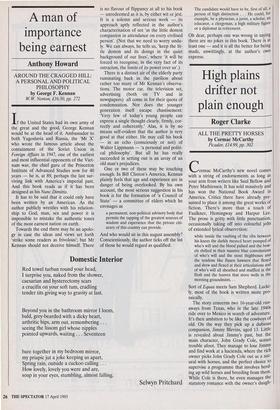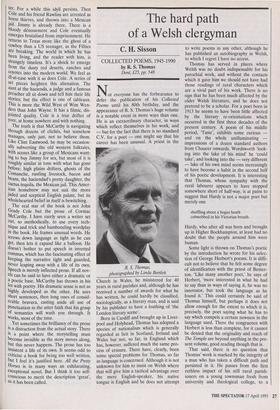High plains drifter not plain enough
Roger Clarke
ALL THE PRETTY HORSES by Cormac McCarthy Picador, £14.99, pp. 302 Cormac McCarthy's new novel comes with a string of endorsements as long as your arm from writers like Saul Bellow and Peter Mathiessen. It has sold massively and has won the National Book Award in America. Critics there have already pre- sumed to place it among the great works of fiction. There's more than a touch of Faulkner, Hemingway and Harpur Lee. The prose is gritty with little punctuation, occasionally taking off into colourful jolts of extended lyrical observation:
while inside the vaulting of the ribs between his knees the darkly meated heart pumped of who's will and the blood pulsed and the bow- els shifted in their massive blue convolutions of who's will and the stout thighbones and the tendons like flaxen hawsers that flexed and drew and flexed at their articulations and of who's will all sheathed and muffled in the flesh and the hooves that stove wells in the morning groundmists...
Sort of Equus meets Sam Shepherd. Lucid- ly, most of the book is written more pro- saically.
The story concerns two 16-year-old run- aways from Texas, who in the late 1940s ride over to Mexico in search of adventure. It's their ambition to be like the cowboys of old. On the way they pick up a dubious companion, Jimmy Blevins, aged 13. Little is revealed about Jimmy's past, but the main character, John Grady Cole, senses trouble afoot. They manage to lose Jimmy and find work at a hacienda, where the rich owner picks John Grady Cole out as a nat- ural with horses, and the perfect choice to supervise a programme that involves herd- ing up wild horses and breeding from them. While Cole is there, he even manages the statutory romance with the owner's &ugh'
ter. For a while this idyll persists. Then Cole and his friend Rawlins are arrested as horse thieves, and thrown into a Mexican jail. Jimmy is already there. There is a bloody denouement and Cole eventually emerges brutalised from imprisonment. He returns to Texas more like the ghost of a cowboy than a US teenager, as the Fifties are breaking. The world in which he has been living, and the reader with him, is strangely timeless. It's a shock to emerge from the dusty red deserts, ranches and coyotes into the modern world. We feel as ill-at-ease with it as does Cole. A series of set pieces heighten this alienation. The aunt at the hacienda, a judge and a famous preacher all sit down and tell him their life stories; but the effect is one of tableaux. This is more the Wild West of Wim Wen- ders than John Wayne. It has a filmic, dis- jointed quality. Cole is a true drifter of yore, at home nowhere and with nothing. The truth is that McCarthy is navigating through dozens of clichés, but somehow manages, only just, not to believe them. Like Clint Eastwood, he may be occasion- ally subverting the old western folktales, with scenes like a group of Mexicans want- ing to buy Jimmy for sex, but most of it is roughly similar in tone with what has gone before; high plains drifters, ghosts of the Comanche, rustling livestock, bacon and beans, the haciendad's pretty daughter, the cactus tequila, the Mexican jail. This Amer- ican homebrew may not suit the more jaded and sceptical English palate, but its Wholehearted belief in itself is bewitching.
The real star of the book is not John Grady Cole but the prose of Cormac McCarthy. I have rarely seen a writer set out, so methodically, to use every tech- nique and trick and bamboozling wordplay in the book. He frames unusual words. He screws down language as tight as he can get, then lets it expand like a balloon. He doesn't bother to put speech in inverted commas, which has the fascinating effect of keeping the narrative tight and guarded, never leaping away with a life of its own. Speech is merely inflected prose. If all nov- els can be said to have either a dramatic or a poetic base, McCarthy has thrown in his lot with poetry. His dramatic sense is not as highly developed as the other. He uses short sentences, then long ones of consid- erable bravura, casting aside all use of Punctuation in the utter faith that his grasp of semantics will wash you through. It Works, most of the time.
Yet sometimes the brilliancy of the prose Is a distraction from the actual story. There is a point where the storytelling must become invisible as the story moves along, but this never happens. The prose has too Insistent a life of its own. It seems odd to criticise a book for being too well written, but I feel it's justified here. All the Pretty Horses is in many ways an exhilarating, exceptional novel. But I think it too self- conscious to merit the description 'great', as it has been called.



















































 Previous page
Previous page